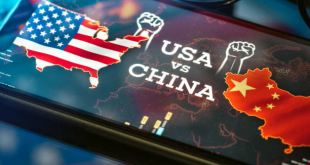Compiled by Staff writer
Published: December 04,2023

“Come to China; Africa and look around. You know America and France and Britain to your sorrow. Now know the Soviet Union and its allied nations, but particularly know China. China is the flesh of your flash and blood of your blood. China is colored and knows what the colored skin in this modern world subjects its owner.” William B. Du Bois
William Edward Burghardt Du Bois, was an African-American, who participated in the creation of National Association for Advancement of colored people and also a leading figure in the organization of Pan African Movement, during the first half of the 20th Century. In 1959, he was invited to visit China by the China Peace Committee and the Chinese Peoples Association for Cultural Relations with foreign countries.
At the capital Peking then, now Beijing, he made solemn appeal to Africa to reach out and engage China. Du Bois whose entire career was spent in militant advocacy for Africa Unity and improvement in the quality of living standards for Africans both in the continent and Diaspora relocated from the United States of America to live in Ghana, until he passed away on August 27, 1963. His clarion call resonates in the current time with the bourgeoning and wide ranging cooperation between Africa and China across all key issues of international cooperation.
From the moment of the founding of the People’s Republic of China, the Communist Party of China sought engagement with Africa. Presenting a report to the founding session of the National People’s Congress- China’s national parliament in 1954, Premier Zhou Enlai outlined plans to promote relations with Africa and Middle Eastern countries. However, the Asian-African conference of Bandung Indonesia, in 1955 provided the definitive framework for cooperation with Africa.
Prior to the Bandung conference, the Communist Party of China hosted some leading figures in Africa liberation movements. In 1953, it hosted the General Secretary of the South Africa’s African National Congress (ANC) Mr. Walter Sisulu and in the same year, the party received Felix Moumie, leader of Cameroonian UPC that flatly declined any cooperation with French imperialists.
A leading figure from Zanzibar who was later to serve in the Tanzanian Government under Mwalimu Julius Nyerere after the federation of Zanzibar and Tanganyika was consummated to form the Republic of Tanzania in 1964; Abdulrahman Babu also visited China in 1959. Babu, a well-known Marxist revolutionary and Pan African activist advocated for vigorous closer China-Africa ties, noting that “China’s socialist revolution was an extension of its own national liberation struggle and consequently there was a very thin dividing line between her nationalism and socialism. The dual loyalty to the two great movements of the period enabled the Chinese to share intimately the sentiments and aspirations of Africa liberation struggles and the struggle for national reconstruction, both for which were Africa’s top priority.”
From the period of the victory of the Chinese revolution and the emergence of its national leadership with the Communist party of China at the core, China has maintained a steady vision to collaborate with Africa not only to achieve independence from colonial domination but to build self-reliant economies that would guarantee high quality of living standards for the respective peoples of the two sides.
China knows and understands racial abuses in its extremities and could easily connect with Africa where racial abuses took institutional form as it was orchestrated and perpetuated by colonial domination.
Supporting Africa’s liberation movements and other nationalist forces in the struggle to end colonial rule was a crucial duty which the new China assumed with passionate devotion. The Communist Party of China led the fraternal outreach Africa and provided the momentum which has sustained the long trajectory of broadly shared cooperation that have traversed solidarity against colonial and imperialist abuses to pragmatic engagement that is currently delivering tangible and practical support to Africa in Key areas of economic reconstruction.
The contemporary cooperation between Africa and China has been wide-ranging and bears practical and tangible results in all spheres.
Book Review: A century of the Communist Party of China. Why Africa should engage its experience. Chapter five of the book, by Charles Onunaiju
 Africa -China Review Africa -China Cooperation and Transformation
Africa -China Review Africa -China Cooperation and Transformation
